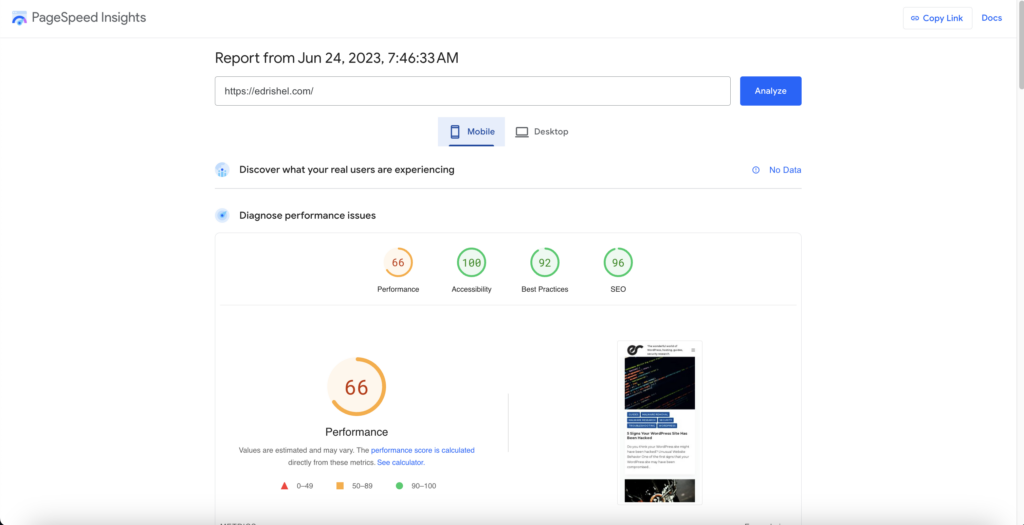The Google Site Kit for WordPress aims to provide website owners with valuable insights into their site’s performance by integrating various Google services. However, some users have reported experiencing performance issues after installing the Google Site Kit plugin. I’m one of those users that noticed 40-point drops with PageSpeed Insights.

Google’s own tool gives some hints under Diagnose Performance Issues which can sometimes be corrected by simply disabling the plugin.
Why Does the Google Site Kit Plugin Affect WordPress Performance?
Incompatibility with Other Plugins
When it comes to WordPress, the combination of plugins used on a website plays a significant role in its overall performance. The Google Site Kit plugin interacts with other plugins and services, which can lead to conflicts and compatibility issues. These conflicts may result in slower page loading times, increased server resource consumption, and overall poor website performance.
Excessive Resource Consumption
The Google Site Kit plugin fetches data from various Google services, such as Google Analytics, Search Console, AdSense, and PageSpeed Insights. While this data is crucial for website owners to analyze their site’s performance, the continuous fetching and processing of data can consume excessive server resources. This increased resource consumption can slow down the website and impact its overall performance.
Plugin Overhead and Bloat
Every plugin added to a WordPress website introduces additional code and functionality. The more plugins installed, the greater the chance of plugin overhead and bloat. The Google Site Kit plugin, with its integration of multiple Google services, adds a significant amount of code to the website. This additional code can increase the website’s loading time and negatively impact performance.
External API Requests
To provide the data and insights it offers, the Google Site Kit plugin needs to make requests to external APIs. These API requests involve network communication and can introduce delays in retrieving the required data. If the external API experiences high traffic or latency issues, it can further slow down the website’s performance.
Lack of Optimization
While the Google Site Kit plugin itself may not be inherently problematic, its default configuration might not be optimized for every WordPress installation. Each website has unique requirements and performance considerations. Failing to optimize the plugin settings according to the specific needs of the website can result in decreased performance.
Solutions to Improve WordPress Performance with the Google Site Kit Plugin
Identify and Resolve Plugin Conflicts
To mitigate performance issues caused by plugin conflicts, it is essential to identify the conflicting plugins and resolve the conflicts. Start by deactivating all plugins except the Google Site Kit plugin and check if the performance improves. Then, reactivate the other plugins one by one and monitor the performance after each activation. This process will help identify the conflicting plugins, allowing you to take appropriate action, such as finding alternative plugins or seeking compatibility fixes.
Optimize Plugin Settings
The Google Site Kit plugin provides various settings and configuration options that can be adjusted to optimize its performance. Analyze the specific needs of your website and fine-tune the plugin settings accordingly. For example, you can adjust the frequency of data fetching, limit the number of displayed metrics, or disable certain integrations that are not essential for your analysis. By optimizing the plugin settings, you can reduce unnecessary resource consumption and improve overall performance.
Utilize Caching Mechanisms
Implementing caching mechanisms can significantly improve website performance by storing frequently accessed data and serving it quickly to visitors. WordPress offers several caching plugins that can be used in conjunction with the Google Site Kit plugin. These caching plugins generate static HTML versions of your web pages, reducing the need for dynamic content generation on each request. By leveraging caching, you can mitigate the impact of the Google Site Kit plugin on performance.
Consider Server and Hosting Upgrades
If your website experiences consistent performance issues even after optimizing the Google Site Kit plugin and resolving conflicts, it might be time to consider server and hosting upgrades. Upgrading to a higher-performance server or choosing a reputable hosting provider can significantly improve your website’s performance. Ensure that the server or hosting plan meets the resource requirements of the Google Site Kit plugin and other plugins installed on your website.
Frequently Asked Questions (FAQs)
Does the Google Site Kit plugin slow down my website?
Yes, the Google Site Kit plugin can potentially slow down your website due to its resource consumption, conflicts with other plugins, and external API requests. However, by following the solutions mentioned above, you can mitigate these issues and optimize your website’s performance.
Can I use the Google Site Kit plugin without affecting my website’s performance?
Yes, it is possible to use the Google Site Kit plugin without significant performance impact. By carefully managing plugin conflicts, optimizing plugin settings, utilizing caching mechanisms, and considering server and hosting upgrades, you can maintain a well-performing website while benefiting from the insights provided by the plugin.
Are there alternative plugins to the Google Site Kit plugin?
Yes, there are alternative plugins available that offer similar functionalities to the Google Site Kit. Some popular alternatives include MonsterInsights, Jetpack by WordPress.com, and All in One SEO Pack. Consider exploring these alternatives if the performance issues persist or if you require specific features not provided by the Google Site Kit plugin.
How can I optimize the Google Site Kit plugin for better performance?
To optimize the Google Site Kit plugin for better performance, you can follow these steps:
Review the plugin settings
Take a closer look at the plugin settings and configure them based on your website’s requirements. Disable any unnecessary integrations or features that you don’t need.
Set appropriate data fetching intervals
Adjust the frequency of data fetching according to your needs. Fetching data too frequently can increase server resource consumption, so find the right balance for your website.
Limit displayed metrics
Determine which metrics are most important to you and display only those. By reducing the number of displayed metrics, you can reduce the processing load on your website.
Utilize advanced caching
Implement advanced caching mechanisms, such as object caching and page caching, to speed up the rendering of your website’s pages. This can significantly improve performance when combined with the Google Site Kit plugin.
Regularly monitor performance
Keep an eye on your website’s performance using tools like Google PageSpeed Insights or GTmetrix. Regular monitoring will help you identify any performance issues and allow you to take prompt action.
Can the Google Site Kit plugin affect SEO?
No, the Google Site Kit plugin itself does not directly affect SEO. However, it provides valuable insights and data from various Google services, such as Google Analytics and Search Console, which can help you make informed decisions to improve your website’s SEO performance.
Should I uninstall the Google Site Kit plugin if it affects my website’s performance?
Uninstalling the Google Site Kit plugin should be the last resort if you have exhausted all optimization options and the performance issues persist. Before uninstalling, make sure to backup your website and test the performance without the plugin to see if it improves. Consider alternative plugins or consult with a WordPress expert if you still require the functionality provided by the Google Site Kit.
The Google Site Kit plugin for WordPress offers valuable insights into your website’s performance by integrating various Google services. However, it can impact performance due to conflicts with other plugins, excessive resource consumption, and external API requests. By following the optimization solutions mentioned in this article, you can mitigate these issues and ensure a better overall performance for your WordPress website. Remember to regularly monitor your website’s performance and make necessary adjustments to maintain optimal functionality. With proper optimization, you can leverage the benefits of the Google Site Kit plugin while providing a smooth browsing experience for your visitors.








